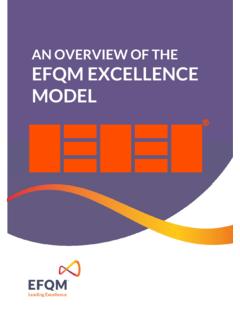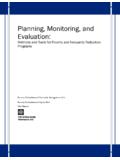Transcription of EFQM User Guide
1 benchmarking Guidelines efqm user Guide efqm user Guide efqm Shares What Works We are committed to helping organisations drive improvement through the efqm Excellence Model, a comprehensive management framework used by over 30,000 organisations in Europe. To help you implement our Model, we provide training and assessment tools as well as recognition for high performing organisations. But our real talent comes from gathering good practice and sharing them through our network. We at efqm , a not for profit membership Foundation founded in 1989, aim to share what works, through case studies, online seminars, working groups, conferences and thematic events. Sharing our members' enthusiasm, their motivation and the results they achieve; that is what we work for. The efqm Team: January 2014. For more information about efqm : Website : Email : 2.
2 Introduction The value add of benchmarking for any organisation's drive to be the best of the best : benchmarking is the practice of being humble enough to admit that someone else is better at something and wise enough to try and learn how to match and even surpass them at it.. APQC. Where did it all begin? The word benchmark is not of this century or even the century before. Depending on which story you prefer, it was either: a) First used in the mid 1800's in the world of surveyors, it being a mark cut into a wall, pillar, or building as a reference point in measuring altitudes. b) First used by shoemakers, to measure a person's feet for a pair of shoes. The shoemaker would place the customer's foot on a bench and then mark it out to make a template for the shoes. In the world of modern day management benchmark has come to represent the level of performance to which others must aspire if they are to be seen as offering outstanding levels of performance.
3 Certainly to win the efqm Excellence Award, an organisation has to demonstrate that it is performing at a level above others, including its peers operating in the same environment. In the efqm Excellence Model 2013, benchmarking is defined as: benchmarking : A systematic comparison of approaches with other relevant organisations that gains insights that will help the organisation to take action to improve its performance.. It should be noted that the focus is on understanding HOW someone does something, not just the results they achieve. There is a clear distinction between benchmarking and comparing data, which is defined in the Model as: Comparisons: Data used to compare the performance of one organisation or process with another.. This is reflected in the RADAR logic we use to assess. The ability to demonstrate that the way approaches and processes are conducted have been BENCKMARKED with other organisations would be considered when assessing the Enablers.
4 The ability to demonstrate how performance COMPARES with other organisations would be considered when assessing the Results. 3. efqm user Guide What is benchmarking ? There are many definitions of benchmarking available on the Internet, most of them perfectly sensible. The exact wording of a definition is not the most important point. What is important is that each organisation takes ownership of its own definition, communicates it well internally and makes sure that the definition works within its current context. Fundamentally, regardless of the specific definition adopted, it is about an organisation using a structured approach to step outside the four walls of its own house to see how others are performing similar tasks but achieving better results. It is a learning opportunity that is only completed when the lessons learnt have subsequently been incorporated into the organisation's own way of working.
5 One point that is often debated, although rarely concluded, is how to define Best Practice . At efqm , we prefer using the expression Good Practice rather than Best Practice because who is to say what is truly best , especially when comparing organisations of completely different sizes and sectors? An organisation undertaking a benchmarking project will identify an outstanding practice that works incredibly well for another organisation, and it may be best for them but it is not simply a matter of doing the equivalent to doing a cut and paste and transplanting that practice into one's own organisation. Just because something works effectively in one organisation or situation does not necessarily mean it will perform the same way in another. There are many factors which influence the efficiency and effectiveness of an approach, some of which, like organisational culture, are not easily transferable.
6 What the organisation undertaking the benchmarking exercise should look for is an understanding of why the other organisation does something in a particular way, why it works for them, draw inspiration from it and decide how they can take the learning and make it a Good Practice within their own context. Why bother benchmarking ? There can be several reasons for an organisation to undertake a benchmarking activity. These may include: To create a better understanding of the current position/performance of an organisation (its strengths and areas for improvement), especially in those processes and performance areas which are critical to supporting the creation and execution of the organisation's strategy To help focus on the capabilities/competences critical to building a strategic advantage To measure its performance against other organisations, analysing the reasons for any differences and then setting appropriate targets for improvement To identify areas where waste can be cut or investment in people/equipment, needs to be made To encourage the discovery of new ideas by looking outside the organisation and encourage sharing on good practices To obtain data, information, knowledge to support fact based decision making for change To provide the organisation's people with a lightning rod around which they can congregate and be motivated/empowered.
7 To take the organisation to the next level of performance To enhance the organisation's reputation. There is nothing wrong with being able to proudly state that you are #1 and can prove it. It's the top box on the RADAR scorecard we use for assessments To challenge the status quo and keep the organisation moving. Of the potential benefits listed above, identify the top 2 or 3 that you think are the most important for your organisation and then ask colleagues to do the same exercise and check for consensus. If you do not have a shared view of why you are undertaking a benchmarking exercise then probably at least one of you will be disappointed with the outcome. 4. The Downside? The world moves on. Remember that what is considered as excellent today may only be adequate tomorrow. Comparisons and benchmarks can be useful for setting targets but, if you set a goal of reaching the today's world class performance level in 3 years, will it still be world class when you get there?
8 If you truly want to achieve world class levels, it's more than likely you'll need to innovate rather than imitate. So, in this light, is there any value in benchmarking ? As many innovations are not genuinely new ideas, they're just new within that context, it depends where you're looking for inspiration. "Innovation distinguishes between a leader and a follower." Steve Jobs 5. efqm user Guide What are the different types of benchmarking ? There are many different types and classifications for benchmarking activities. We've highlighted 8 below to give some indication of the different types of activities you may want to consider: 6. Strategic benchmarking This involves examining long term strategies, for example regarding core competencies, new product and service development or improving capabilities for dealing with change. This type of benchmarking is used by successful high performers in order to improve a business's overall performance.
9 Performance benchmarking (or Competitive benchmarking ) This looks at performance characteristics in relation to key products and services in the same sector. In order to protect confidentiality this type of analysis is often undertaken through trade associations or third parties. Product / Service benchmarking This looks at comparing specific attributes of a product or service. This can either be done internally, for example, where the same product is being manufactured in different locations, or externally, against similar products & services delivered by competitors. Process benchmarking This focuses on improving critical processes and operations through comparison with best practice organisations performing similar work. This often results in short term benefits. Functional benchmarking This compares a business with partners drawn from different sectors to find innovative ways of improving work processes.
10 This can lead to dramatic improvements. Internal benchmarking This involves benchmarking businesses or operations from within the same organisation ( business units in different countries). Access to sensitive and/or standardised data is easier, usually less time and resources are needed and ultimately practices may be relatively easier to implement. However, real innovation may be lacking: best in class performance is more likely to be found through external benchmarking . External benchmarking This analyses best in class outside organisations, providing the opportunity to learn from those at the leading edge. This can take up significant time and resource to ensure the credibility of the findings. International benchmarking This identifies and analyses best practitioners elsewhere in the world, perhaps because there are too few benchmarking partners within the same country to produce valid results.








